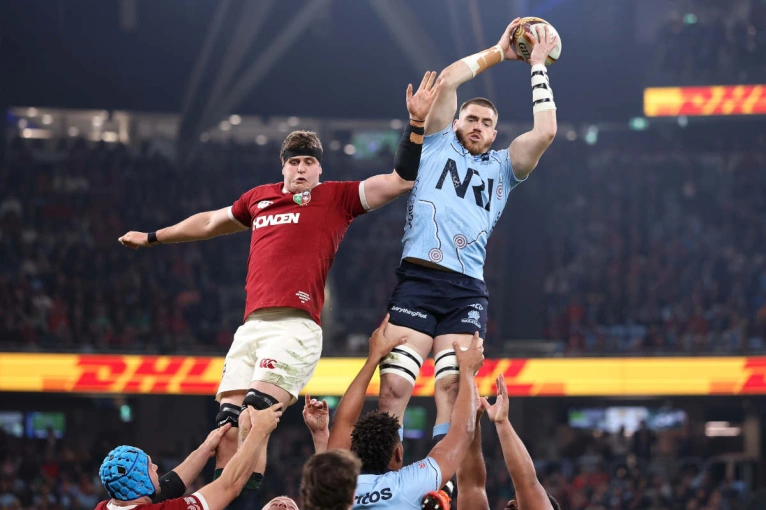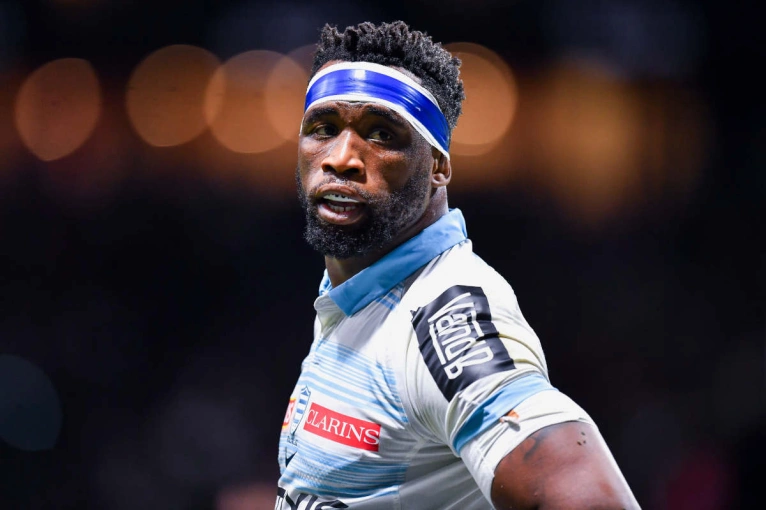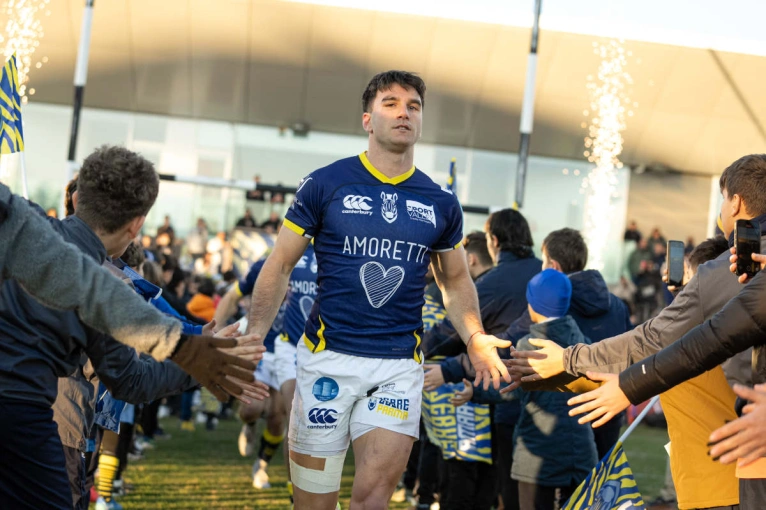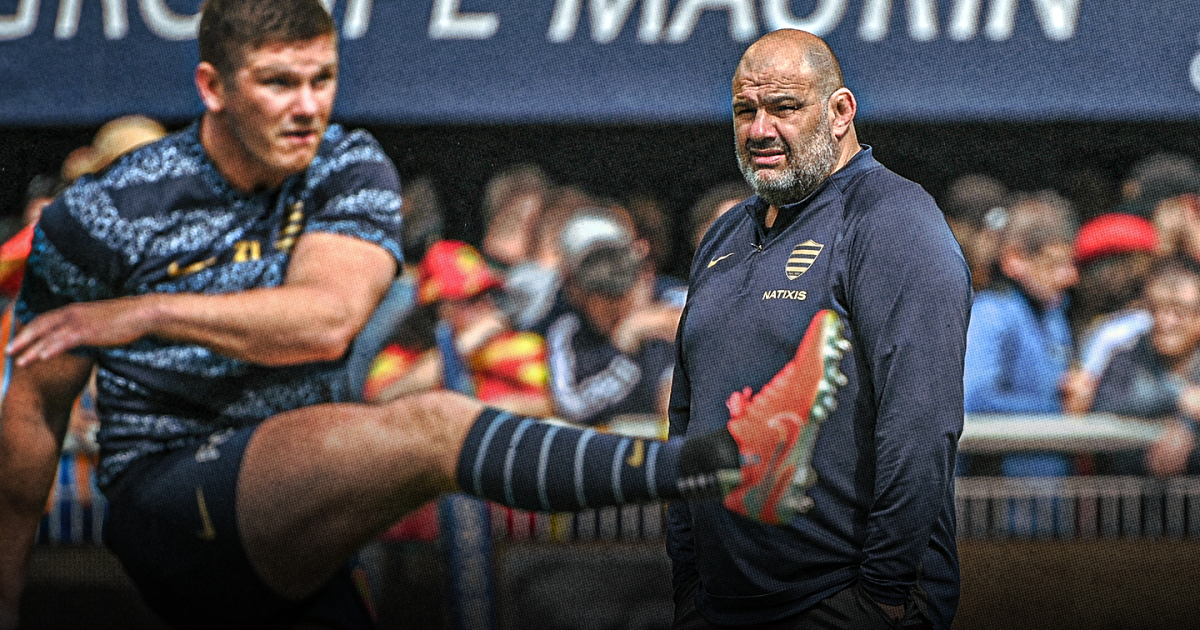For a club recently purchased by an energy drink it’s only natural that Newcastle are increasingly active in the transfer market.
Last week Newcastle Red Bulls, as they are now known, announced the signings of South African fly-half Boeta Chamberlain from the Blue Bulls and Australian lock Fergus Lee-Warner from New South Wales Waratahs. That brought to five the new signings in the past fortnight, following Crusaders flanker Tom Christie, Argentine scrum-half Simon Benitez Cruz and Japan back-rower Amanaki Mafi. Red Bull is certainly giving Newcastle wings, which is a touch ironic for the club formerly known as the Falcons.
The purchase and rebranding of the Falcons was welcomed by one of its former players, Ollie Phillips, who said: “It’s amazing for the sport and for Newcastle.”
Phillips described the acquisition by Red Bull as “a stroke of genius…by buying a team at the bottom of the league, they’re almost guaranteed to succeed.”
 Fergus Lee-Warner, who recently faced the Lions with Waratahs, is one of eight players recruited by Newcastle so far since Red Bull’s takeover (Photo Cameron Spencer/Getty Images)
Fergus Lee-Warner, who recently faced the Lions with Waratahs, is one of eight players recruited by Newcastle so far since Red Bull’s takeover (Photo Cameron Spencer/Getty Images)
Another ex-Falcon was more cautious in his response. Jamie Noon recognised the ‘huge potential’ for Newcastle of the deal, but warned that they can’t “just go all foreign and bring in a host of Kiwis and South Africans”.
In Noon’s view that would be a sign of short-termism. Instead, the former England centre advised Newcastle to be “clever” and “make some good decisions based on the long-term project”.
Noon left Newcastle in 2010 for a swansong in France with Brive, an era when Englishmen were all the rage with the French club. Shaun Perry, Ben Cohen, Andy Goode, Steve Thompson, Ben Johnston, Shane Geraghty and Riki Flutey all signed for Brive but Noon was the only one to live up to his billing. He still lives in France where he has established himself as a successful agent.
It appears that Farrell was the final straw for Racing’s commendably patient owner, Jacky Lorenzetti, who bought the club in 2006 with the objective of turning it into France’s dominant force.
In recent years Noon has seen a growing number of British and Irish players come to France; some are a roaring success, but others leave with their tails between their legs.
This is particularly true at Racing 92. The Parisian club has signed some of the biggest names in world rugby in the last decade or so: Johnny Sexton, Jamie Roberts, Dan Lydiate, Dan Carter, Johan Goosen, Trevor Nyakane, Kurtley Beale, Finn Russell, Patrick Lambie, Emiliano Boffelli, Siya Kolisi and Owen Farrell. Most were on salaries similar to Sexton’s €750,000 per season. And what has been Racing’s return for all their investment? The Top 14 title in 2016.
 Springboks captain Siya Kolisi arrived at Racing to much fanfare after RWC23, but left one year into a three-year contract (Photo Franco Arland/Getty Images)
Springboks captain Siya Kolisi arrived at Racing to much fanfare after RWC23, but left one year into a three-year contract (Photo Franco Arland/Getty Images)
It appears that Farrell was the final straw for Racing’s commendably patient owner, Jacky Lorenzetti, who bought the club in 2006 with the objective of turning it into France’s dominant force. Farrell arrived in Paris last summer on a two-year contract, but he returned to Saracens in June after a wretched few months at Racing.
According to a report in last week’s Midi Olympique, Racing have decided to head in a different direction, a decision that perhaps should serve as a warning to Newcastle Red Bulls.
Racing got entangled in a relegation dogfight at the end of last season, eventually battling its way to 10th spot, the club’s worst finish since it was promoted to the Top 14 in 2009. That led to some summer soul-searching, explained head coach Patrice Collazo. “We asked the question: what do we want for Racing in the future…and what could we put in place to begin constructing the Racing of tomorrow?”
Racing needs to get its act together as a team. We no longer want to be dependent on one player.
The conclusion, says Midi Olympique, is the ‘exit of the star-system’. No more Farrells, Kolisis and Sextons. “We were mainly looking for recruits who would fit in with a new project,” said Collazo, who was appointed coach midway through last season after Stuart Lancaster was relieved of his duties. True, Racing have signed former England and Lions second-row Jonny Hill and Wallaby prop Taniela Tupou, but most of their backline recruits this season are unheralded: Brive scrum-half Léo Carbonneau to replace Nolann Le Garrec, who has moved to La Rochelle; Grenoble wing Wilfried Hulleu for Henry Arundell, and Zebre’s Gerónimo Prisciantelli for Farrell.
Collazo justified this new approach by saying: “Racing needs to get its act together as a team. We no longer want to be dependent on one player.” It was, he concluded, perhaps “another way of thinking about the club and viewing others”.
 Gerónimo Prisciantelli’s signing from Zebre is a departure for Racing after a line of marquee No 10s in Sexton, Carter, Russell and Farrell (Photo Alessandro Levati/Getty Images)
Gerónimo Prisciantelli’s signing from Zebre is a departure for Racing after a line of marquee No 10s in Sexton, Carter, Russell and Farrell (Photo Alessandro Levati/Getty Images)
Who knows, perhaps Lorenzetti was influenced by the success of the city’s football club, Paris Saint-German, who last season won the Champions Cup for the first time. For years PSG assumed the only way to win Europe’s most prestigious title was with superstars. But Neymar, Julian Draxler, Lionel Messi and Kylian Mbappe couldn’t realise the PSG dream.
When Luis Enrique became coach in 2023, he began to dispense with the galácticos and instead put the emphasis on forging a clear identity using younger and hungrier players.
“My happiness is not linked to trophies but to the implication of the players,” Enrique said at the start of the 2024-25 season. “The profile of the players we have signed allows us to work over the medium to long term. Everything is in place to do great things.”
Racing have now embraced this philosophy, and so should Newcastle Red Bulls if they want to prosper. Because it’s not money that guarantees success, it’s attitude.

